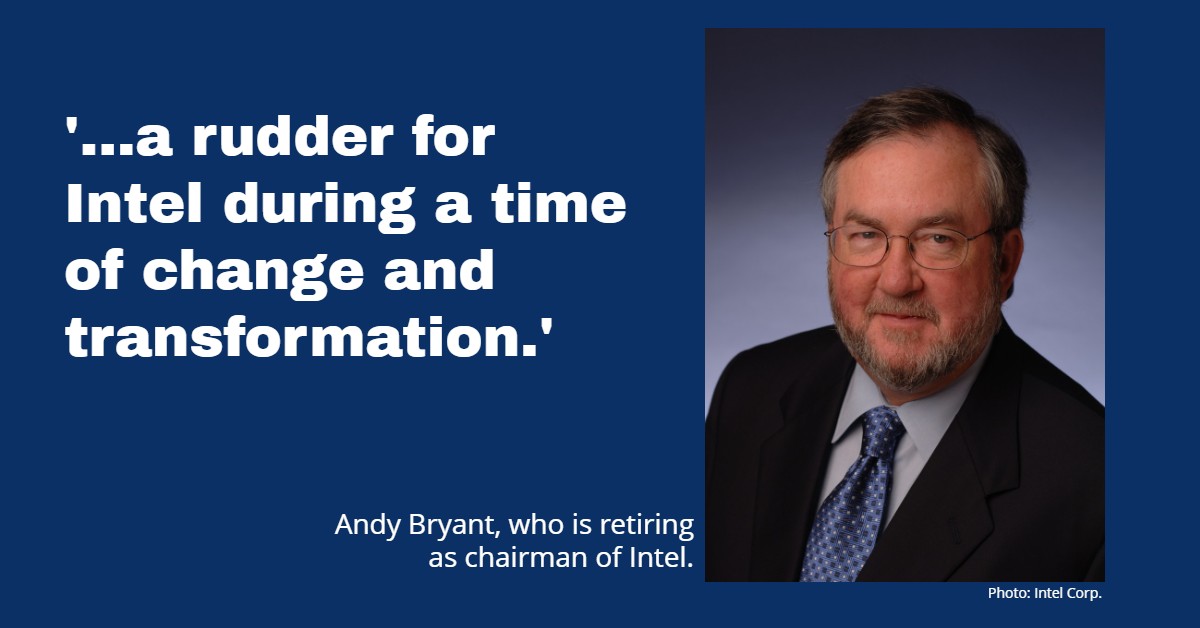As the people of Intel honor and thank Andy Bryant as he retires as the company’s chairman, I suspect many of them are already missing their periodic access to his insights and counsel—about the company and its direction, about industries and their dynamics, or about their own roles, contributions and careers.
Because no leader was ever more generous with his time and intelligence—or his candor. Andy was known for offering honest and penetrating insights about Intel, its strategy and its marketplace, not only in public conferences and employee forums, but especially in one-on-one meetings with Intel employees beyond his direct reports and peers. I was one of the many beneficiaries of those occasional 50-minute hours, where Andy quietly fielded any question or request for advice, well-informed or not.
I don’t know how he found the time. But a more interesting question is: why did he make the time? My theory: he felt a responsibility to the company and its humans; he saw the discussions as an opportunity to develop talent and to align energy with the company’s strategy; and he was inherently kind.
Andy’s quiet manner could sometimes mask the strength of his influence. In group meetings I witnessed, he spoke far less than others but usually with far greater impact. His questions could be Socratic, to further understanding, or pointed, to identify a perilous path. He also asked plain-old open-ended questions to learn. He would begin our one-on-ones by asking, “What do you want to talk about?”—but he usually had a nudge already in mind to shape (in my case) my work in employee communications or industry analyst relations.
Having joined Intel in 1981, Andy had a front-row seat or leadership role in some of the most consequential moments and decades in the information technology industry: memories, processors, PCs, servers, internet, communications, data centers, artificial intelligence. My sense is that the many Intel CEOs Andy worked with over decades had their own varying levels of dependence on Andy’s counsel—intensely close at times, more distant at others. But my strong bet is that the other execs who worked for those CEOs tapped Andy constantly to talk through challenges, possibilities, and scenarios, for their groups and for themselves. Because in Andy you had a leader who was humble enough to listen fully and to offer his unvarnished mistakes as lessons—and a strategist boldly ready to suggest audacious steps to realize unrecognized possibilities.
That is the humble audacity of Andy Bryant.
In a statement, Intel CEO Bob Swan thanked Andy “for over seven years’ service as chairman of the board” and said: “Andy has been a rudder for Intel during a time of change and transformation. He has led the board with integrity and always with Intel’s best interest in mind.”
Swan could’ve been describing Andy’s entire career at Intel. I’ll bet Swan could also have added, “Andy helped us longer than he’d planned, because we asked.” Andy often spoke of the importance of acting like an owner—he meant responsibility, not entitlement—and he lived that principle. Andy Grove once told me he considered Andy Bryant a “hero.” I don’t remember when Grove said it, but my guess is he was reflecting on Andy Bryant’s cumulative impact on Intel’s journey over decades.
The striking candor that people so valued in Andy was a magical thing.
The striking candor that people so valued in Andy was a magical thing. He was able to talk openly and insightfully about sensitive highs and lows in the business while maintaining total respect for all players and unwavering commitment to the company. He shared the philosophy behind this magic in a “Corner Office” interview in The New York Times:
“And there were times I thought the company made the wrong decision. You can’t undermine the decision, but I developed an approach with my employees if they thought my way was right, but it was not what the company had decided. If they asked me about it, I’d say: ‘I want to give you two answers. I would have gone a different way, and here’s why. On the other hand, I want you to understand why the C.E.O. or whoever made this decision. I don’t know if I’m right and they’re wrong. What I know, though, is that they were empowered to make the decision. It’s a decision that can be defended, and our job now is to optimize that decision.’ People always knew that they were going to hear what I really think.” (Read the full interview here.)
If I could gather up most of the books on business strategy and leadership and trade them for another 50-minute hour with Andy—of him telling me the “whys” of his thinking—I’d be at his door.
I didn’t share a draft of this essay with Andy, so I don’t know how he would’ve reacted (aside from a likely quiet dismissal). But I can imagine him saying, “Well, you should think about what’s important, and where you want to spend your time.”
Andy thought the humans of Intel, and the institution of Intel, were worthy of his time. He gave them that, and more. And we’re so much the better for it.


